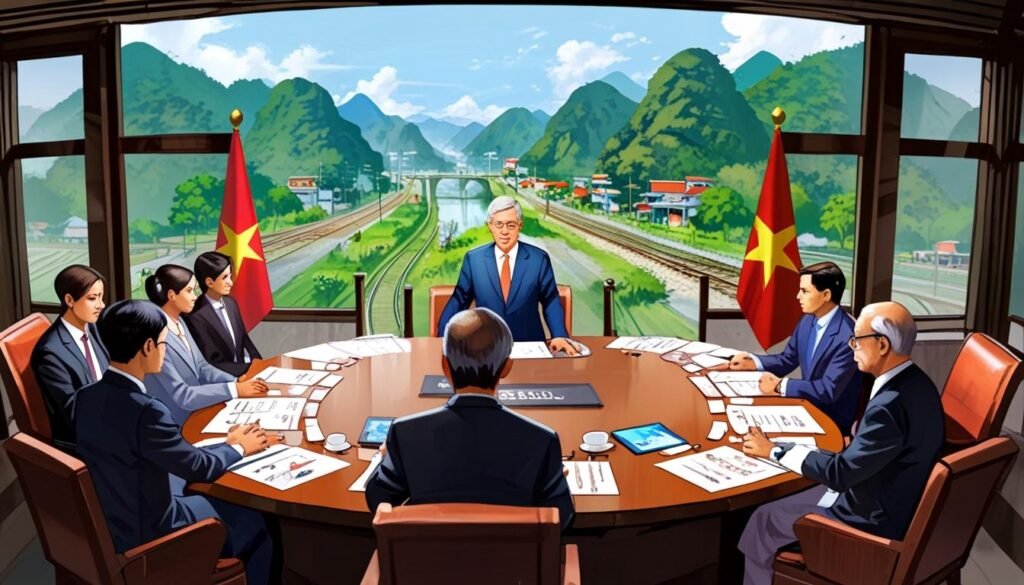**Hanoi**: Chinese President Xi Jinping has concluded his first overseas trip of 2023, enhancing cooperation with Vietnam amid shifting global trade dynamics. The visit resulted in 45 agreements across various sectors, aiming to solidify economic ties and regional stability amid ongoing tensions with the US.
Chinese President Xi Jinping has embarked on his first overseas trip of 2023, focusing on strengthening ties with Vietnam amid an evolving regional economic landscape. This visit comes at a time when global trade dynamics are under scrutiny, particularly following recent tariff increases by the United States.
Xi’s visit to Vietnam included meetings with senior members of the Vietnamese leadership, including the General Secretary of the Communist Party of Vietnam, To Lam, and Prime Minister Pham Minh Chinh. During these discussions, Xi expressed the need for both countries to unite against what he described as “unilateral bullying” to sustain the stability of global free trade and supply chains. He underscored this point when speaking to Xinhua, stating, “China’s mega-market is always open to Vietnam,” and called for a collaborative approach to enhancing economic globalization that is both inclusive and balanced.
The trip concluded with the signing of 45 agreements across various sectors, including infrastructure, artificial intelligence, customs inspection, agricultural trade, and cultural exchanges. Highlighting the importance of infrastructure development, both leaders agreed to form a committee dedicated to advancing railway cooperation, as noted by Vietnamese state media, VTV.
Vietnam, seeking to enhance its cooperation with China in areas such as security, transport, and technology transfers, looks forward to a more balanced trade relationship with its powerful neighbour. Observers note that Vietnam’s strategic position in the region has been underscored by recent trade tensions between the US and China, positioning it as a critical conduit for Chinese exports. Following tariff hikes initiated by former US President Donald Trump, Xi’s trip may be seen as an effort to bolster China’s influence amid shifting trade patterns.
Prior to his visit, Xi had expressed concerns regarding the implications of trade wars, stating in an article published in Nhan Dan, the Vietnamese Communist Party’s newspaper, that “there are no winners in trade wars or tariff wars, and protectionism leads nowhere.” This sentiment reflects an awareness of the repercussions of increasing trade tensions within the region.
The evolving economic relationship between China and Vietnam has been noteworthy, particularly since the onset of the US-China trade war. Manufacturers have begun relocating operations to Vietnam to circumvent tariffs, resulting in significant foreign investment in Vietnamese industrial zones. Major companies, such as Foxconn and Luxshare Precision Industry, have established production facilities in the northern industrial parks, focusing on components for global brands like Apple.
Trade statistics reinforce the significance of their bilateral relationship, as China represents Vietnam’s largest trading partner, with trade volume exceeding $205 billion in the previous year. Vietnam relies heavily on Chinese imports, particularly for parts and raw materials essential for its industries. In response, the Vietnamese government has committed to accelerating the progress of vital railway projects that will enhance connectivity between the two nations, including an $8.4 billion cross-border railway linking Lao Cai with Hanoi and Haiphong.
Further economic collaboration was evident during the trip, with discussions surrounding aviation between Vietnam and the Commercial Aircraft Corporation of China (Comac). Prime Minister Chinh highlighted the “increasingly positive outcomes” from aviation collaboration and recommended that Comac establish aircraft maintenance and repair facilities in Vietnam, indicating an ongoing commitment to expanding technological ties.
As Xi continues his regional tour with future stops in Malaysia and Cambodia, the potential impact of these dialogues on ASEAN relations and the broader geopolitical environment in Southeast Asia remains to be seen.
Source: Noah Wire Services





